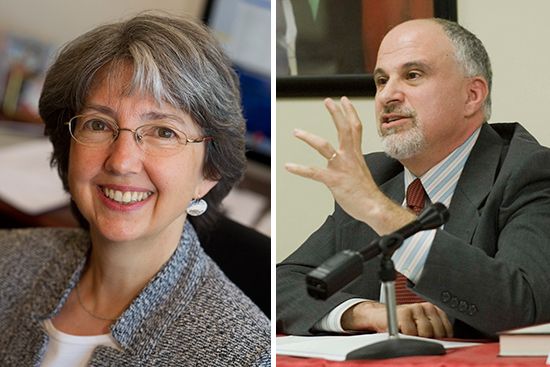Innovative University-Wide General Education Program Proposed
BU Hub, Cross-College Challenge, would begin with 2017 freshmen

Students from different colleges would work together in small teams on projects to tackle “contemporary issues or enduring human questions” under the BU Hub plan. Photo by Cydney Scott.
BU’s undergraduate education would be transformed by a newly proposed University-Wide General Education Program. The proposal calls for BU undergraduates to develop core skills, knowledge, and habits of mind through both course work and cocurricular programs that will prepare them to succeed. Called the BU Hub, the proposal is the work of a 14-member faculty task force that solicited input from hundreds of members of the University community in dozens of meetings over the past 15 months.
Jean Morrison, University provost and chief academic officer, says the new program has the potential to “make a Boston University undergraduate education uniquely valuable. The combination of this innovative general education program with the high-quality programs in which students both major and minor will make BU an excellent place for talented, ambitious students.”
One fundamental change is the inclusion of the Cross-College Challenge, a collaborative project by students from different colleges that will address “contemporary issues or enduring human questions” by producing “a tangible product,” ranging from a written work to a circuit board to a work of art. Other parts of the program will involve new classes and cocurricular programs and will first apply to freshmen entering in fall 2017.
“The Cross-College Challenge is extremely ambitious,” says Morrison. “But it is something that virtually every constituent group the task force consulted, from our students to future employers to faculty, asked for. Our students need more experience working in groups and working on teams where team members have completely different experiences and skills. This would be a unique and really significant experience that will distinguish our graduates as being particularly well prepared for a whole range of 21st-century engagements.”
Task force cochair Elizabeth Loizeaux, associate provost for undergraduate affairs and a College of Arts & Sciences professor of English, says the new program will enable us “to go forward and say, this is what BU understands to be its core. It says who we are at BU.”
In the next step, the proposal, which is posted online, will be considered by the University Council—the University’s faculty governing body—for approval. If the University Council approves the proposal, a separate task force will be established to implement the program over four years, beginning with the fall 2017 incoming freshmen. Current students would not be affected.
General Education is the common core required of undergraduates in all academic programs. It includes a minimum of 40 credits of course work, and is required for University accreditation. Currently, each of the 10 BU undergraduate schools and colleges has its own general education program, and all of them would be replaced by the University-wide BU Hub.

The task force report notes that the BU Hub is intended to “encapsulate an approach to education designed to equip students to engage with complexity, diversity, change, and with enduring features of human cultures.” It is based on a set of core capacities—“areas of knowledge, skills, and habits of mind”—to be acquired by BU graduates, equipping them to thrive personally, professionally, and as citizens.
Core capacities are: philosophical, aesthetic, and historical interpretation; scientific and social inquiry; quantitative reasoning; diversity, civic engagement, and global citizenship; written, oral, and multimedia communication; and an intellectual toolkit that includes critical thinking, collaboration, and creativity.
The proposed toolkit encompasses life-skills education, as requested by many students and some parents—likely a course for freshmen in campus life and academic skills and one for seniors in outside world skills, such as interview techniques and personal finance.
Because the task force members agreed that a one-size-fits-all plan would not suit the distinctive character and history of the University, students will influence the charting of their own paths. Among the possible pathways would be new and existing classes, internships, research projects, and student affairs programming, as well as faculty-led cocurricular activities and engagement with Boston cultural institutions.
“It’s a really substantial change, but it’s also a way for the University to put a stamp on what we are and what we think is essential,” says task force cochair Bruce Schulman, William E. Huntington Professor of History. “It will give people on the faculty an opportunity to do new types of teaching, which in many cases they want to do. It will give students a variety of different kinds of courses and experiences outside the classroom that will immerse them in the city of Boston and other kinds of communities as well.”
Because current University bylaws and the University Council Constitution do not address governance of undergraduate academic programs that span schools and colleges, the Board of Trustees and the University Council are considering appropriate amendments. The proposal will be considered by the standing University Council Committee on Undergraduate Academic Programs and Policies this month and by the full University Council in April and May.
If it passes both, Morrison says, she will appoint a task force of faculty and staff to implement it. “There’s a tremendous amount of work to do if the proposal is approved,” she says. “We will be calling on faculty and staff of all the schools and colleges to help with the effort of thinking through what is the best process for implementing the new general education program.”
“It’s a tall order,” Loizeaux says, “but it’s important to remember that we’ve conceived of General Education as something that happens over a student’s four years, so this will be a four-year rollout.”
Comments & Discussion
Boston University moderates comments to facilitate an informed, substantive, civil conversation. Abusive, profane, self-promotional, misleading, incoherent or off-topic comments will be rejected. Moderators are staffed during regular business hours (EST) and can only accept comments written in English. Statistics or facts must include a citation or a link to the citation.